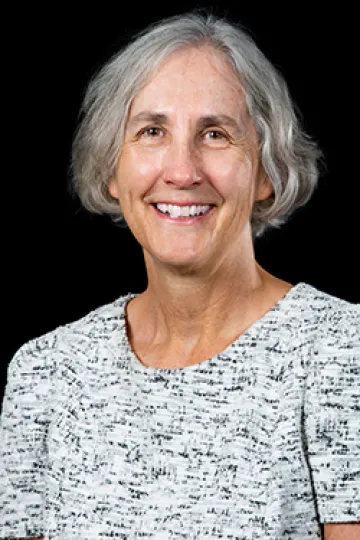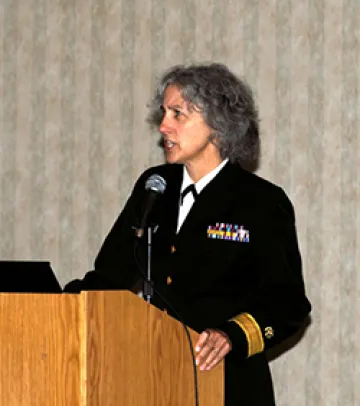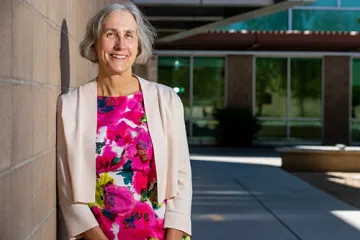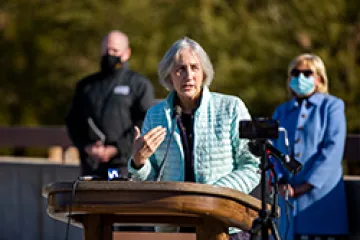Dr. Theresa Cullen Named College of Medicine - Tucson 2021 Alumni of the Year

For Theresa Cullen, MD, MS, the University of Arizona College of Medicine – Tucson's 2021 Alumni of the Year, the COVID-19 pandemic has been a trial by fire.

A 1983 graduate of the college, she was among those recognized Thursday, Nov. 4, 2-5 p.m., during the UArizona's 2021 Alumni of the Year Awards Ceremony at the Student Union Memorial Center's Grand Ballroom.
Dr. Cullen was appointed Pima County Health Director in April 2020 after a successful 27-year U.S. government career in public health and medical informatics. She landed right in the thick of the county's, the state's, the nation's and the world's efforts to understand and rein in the spread of SARS-CoV-2, the novel coronavirus that causes COVID-19. Still, she's seen similar if not quite as global challenges.
Dr. Cullen began as a general medical officer for Indian Health Service hospitals on the San Carlos Apache Reservation and Tohono O'odham Nation. Her career led to multiple postings with the Indian Health Service (where she rose to chief information officer) and the Veterans Administration (where she rose to chief medical information officer and director of health informatics), as well as deployments at home and abroad through the U.S. Public Health Service (where she rose to the rank of assistant surgeon general).
Her deployments include stints in the Gulf Coast during Hurricanes Rita and Katrina in 2005 and West Africa during the 2014-16 Ebola outbreak where she set up a maternity unit for Ebola patients in Freetown, Sierra Leone.
"There was an international cry for people to come deploy," said Dr. Cullen, who also is a clinical associate professor in the college's Department of Family and Community Medicine. "Remember, there was this belief there would be hundreds of thousands of people dying from Ebola. My oldest daughter said to me, 'Mom, we knew you were going to go. We just didn't know when you would figure out you needed to go.' It is the most difficult clinical situation I've ever been in in my life. The amount of death and suffering were pretty unconscionable."

Over the last 10 years before taking the Pima County job, she flew home on weekends to Tucson – of which her husband is a native – or worked remotely from here. Wanting more global exposure, she left the VA in 2015 to work with the Regenstrief Institute, a world health research entity focused on informatics, services and aging at Indiana University in Indianapolis where she became associate director of global health informatics. In the following five years, she spent most of her time overseas, deployed largely to India and Africa. All her deployments, especially Sierra Leone, prepared her for COVID-19.
"What I learned from Ebola has been helpful here, and some of it is this concept of systems thinking," Dr. Cullen said. "We really approached COVID here from that viewpoint of health system strengthening. You ensure there's a consistent approach. You implement based on that. You train based on that. You monitor based on that. You prevent, diagnose and treat, and, then, you work with your communities."
What's made Pima County more successful than other Arizona counties in its pandemic response is that approach, along with more open communications, political support and cooperative communities, she added. In January, Pima County Health ran one of the U.S.'s first large vaccination planning exercises with the aim of giving 300,000 vaccines in three months. "Everybody thought, including myself, we were being very audacious," she noted. "We ended up giving 420,000 vaccines. We're not out of the woods by any means, but we're in a much better position."
Currently, less than 53% of Arizonans are fully vaccinated against COVID-19. In Pima County, that figure is 60% of all residents, including 69% of those age 12 and up, 70% of those 18 and up and 88% of those 65 and older.
This isn't to suggest Pima County hasn't had its share of naysayers on its pandemic response. Some of that made her job and that of her staff more difficult and stressful.

On this particular day, Dr. Cullen noted two news items in the New York Times as indicative of challenges COVID-19 still poses. One was the breakthrough death of former U.S. secretary of state and Joint Chiefs of Staff chairman Gen. Colin Powell, who died after a battle with cancer due to COVID-19 despite having been vaccinated against the disease. The other item focused on threats and hostility toward public health officials over COVID-19 masking and social distancing mandates as well as vaccine hesitancy and resistance has led to a "staggering exodus" of personnel nationwide.
"I've had my life threatened," Dr. Cullen said. "I don't even track social media anymore. We had protests where protesters came into the building almost a year ago now. It's a crazy time. I was taken aback by the national lack of understanding about science and what we were trying to do. We were well-intentioned," but sometimes that's not enough.
The breakthroughs, she said, underscore the need for boosters for those age 65 or over and/or the immunocompromised, as well as to get children ages 5-11 vaccinated when that's approved.
Hesitancy and resistance, she said, require patience and empathy to reach out and break down the barriers through reasoning not conflict.

"Colin Powell's death, for instance, it's really tragic," said Dr. Cullen, who tested positive for COVID-19 herself in December. "But it reveals we all have a responsibility because he got COVID from somebody, even though he was fully vaccinated and had some underlying risk factors. What we need to do is have people continue to understand this is a disease primarily of the unvaccinated. And, if you're unvaccinated, the impact you can have is a risk beyond just yourself." It's a risk for family, friends and colleagues, too.
She said she was honored at being named the College of Medicine – Tucson's Alumni of the Year.
"I'm not a researcher. I haven't discovered a cure for anything. I've done a life of service that I am really blessed to have had the opportunity to do, and with a family that's been really supportive. We've, as a family, made conscious decisions about my position and work to ensure it was consistent with my moral compass, which is that you're supposed to make the world better," Dr. Cullen said.
"For me it feels like an honor, but it also feels like recognition that a life of service matters and is important to the university. I guess that's what I would hope that my getting this award, which I am really humbled by, inspires. It should help other people to understand that the way we impact the world can be just service."
Contacts
David Mogollon

